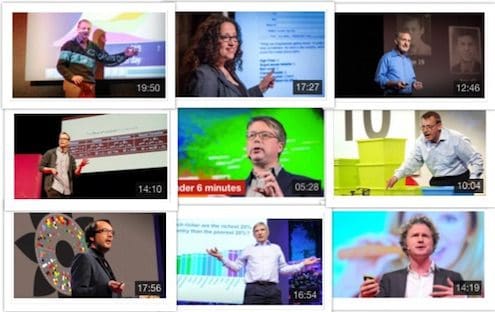 Top 10 TED Talks for the Data Scientists
Top 10 TED Talks for the Data Scientists
TEDTalks have been a great platform for sharing ideas and inspirations. Here, we have sifted ten interesting talks for the data scientist from statistics, social media and economics domains.
TED is a nonprofitable organization devoted to Ideas Worth Spreading – through TED.com, they also schedule annual conferences, and local TEDx events. TEDTalks shares the best ideas from the TED Conference with the world, for free: trusted voices and convention-breaking mavericks, icons and geniuses, all giving the talk of their lives in 18 minutes. Data science has been in center of many of these talks. Here, we have collected top 10 of them based on the number of views.
- The best stats you’ve ever seen (views: 10,406,507)
You’ve never seen data presented like this. With the drama and urgency of a sportscaster, statistics guru Hans Rosling debunks myths about the so-called “developing world.” - How I hacked online dating (views: 4,432,687)
Amy Webb was having no luck with online dating. The dates she liked didn’t write her back, and her own profile attracted crickets (and worse). So, as any fan of data would do: she started making a spreadsheet. Hear the story of how she went on to hack her online dating life — with frustrating, funny and life-changing results. - What makes a good life? Lessons from the longest study on happiness (views: 3,791,115)
What keeps us happy and healthy as we go through life? If you think it’s fame and money, you’re not alone – but, according to psychiatrist Robert Waldinger, you’re mistaken. As the director of a 75-year-old study on adult development, Waldinger has unprecedented access to data on true happiness and satisfaction. In this talk, he shares three important lessons learned from the study as well as some practical, old-as-the-hills wisdom on how to build a fulfilling, long life. - How not to be ignorant about the world (views: 2,711,429)
How much do you know about the world? Hans Rosling, with his famous charts of global population, health and income data (and an extra-extra-long pointer), demonstrates that you have a high statistical chance of being quite wrong about what you think you know. Play along with his audience quiz — then, from Hans’ son Ola, learn 4 ways to quickly get less ignorant. - Global population growth, box by box (views: 2,450,700)
The world’s population will grow to 9 billion over the next 50 years — and only by raising the living standards of the poorest can we check population growth. This is the paradoxical answer that Hans Rosling unveils at TED@Cannes using colorful new data display technology (you’ll see). - Who controls the world? (views: 2,297,109)
James Glattfelder studies complexity: how an interconnected system — say, a swarm of birds — is more than the sum of its parts. And complexity theory, it turns out, can reveal a lot about how the economy works. Glattfelder shares a groundbreaking study of how control flows through the global economy, and how concentration of power in the hands of a shockingly small number leaves us all vulnerable. - The beauty of data visualization (views: 2,277,195)
David McCandless turns complex data sets (like worldwide military spending, media buzz, Facebook status updates) into beautiful, simple diagrams that tease out unseen patterns and connections. Good design, he suggests, is the best way to navigate information glut — and it may just change the way we see the world. - Social maps that reveal a city’s intersections — and separations (views: 2,277,144)
Every city has its neighborhoods, cliques and clubs, the hidden lines that join and divide people in the same town. What can we learn about cities by looking at what people share online? Starting with his own home town of Baltimore, Dave Troy has been visualizing what the tweets of city dwellers reveal about who lives there, who they talk to — and who they don’t. - Battling bad science (views: 1,891,208)
Every day there are news reports of new health advice, but how can you know if they’re right? Doctor and epidemiologist Ben Goldacre shows us, at high speed, the ways evidence can be distorted, from the blindingly obvious nutrition claims to the very subtle tricks of the pharmaceutical industry. - The curly fry conundrum: Why social media “likes” say more than you might think (views: 1,742,215)
Have you Liked them on Facebook? Watch this talk to find out the surprising things Facebook (and others) can guess about you from your random Likes and Shares. Computer scientist Jennifer Golbeck explains how this came about, how some applications of the technology are not so cute — and why she thinks we should return the control of information to its rightful owners.
We hope that you will enjoy this talks. Please, do let us know more about your favorite online talk in data science.
Bio: Devendra Desale(@DevendraDesale) is a data science graduate student currently working on text mining and big data technologies. He is also interested in enterprise architectures and data-driven business. When away from the computer, he also enjoys attending meetups and venturing into the unknown.
Related:

 Top 10 TED Talks for the Data Scientists
Top 10 TED Talks for the Data Scientists